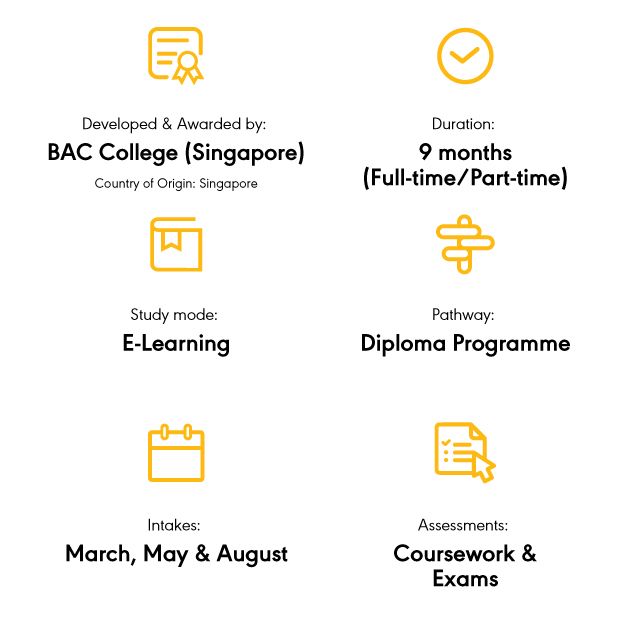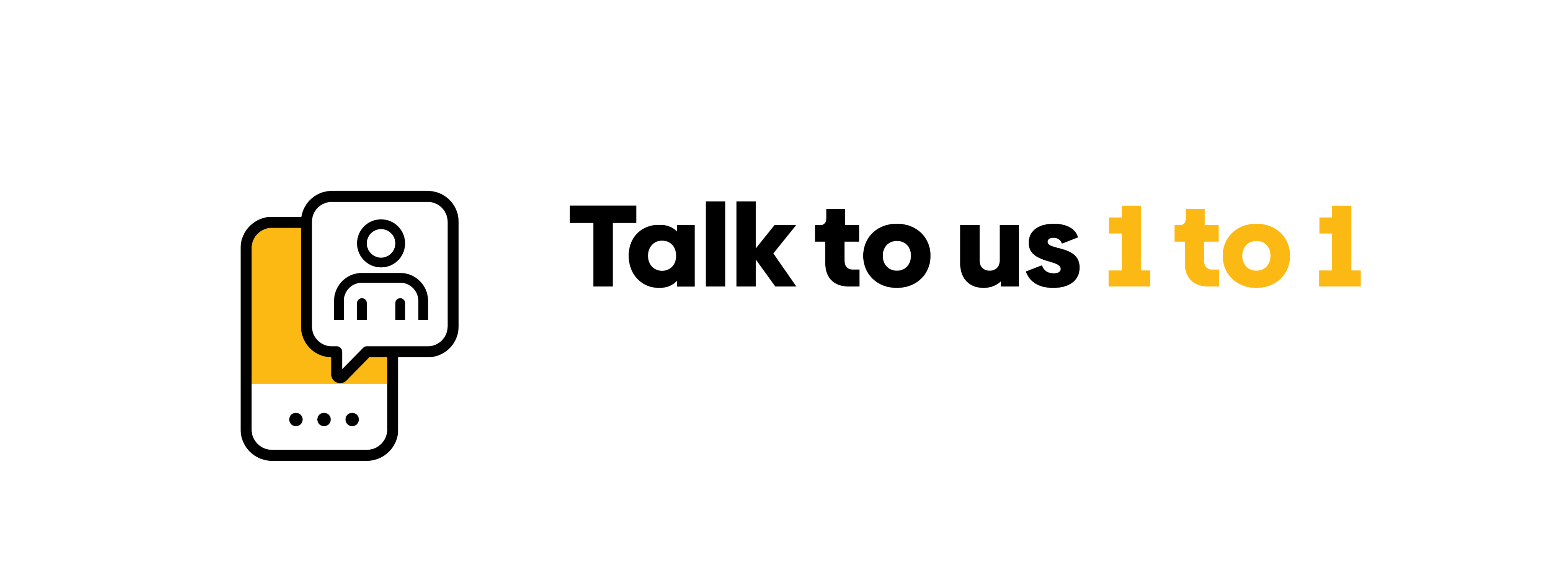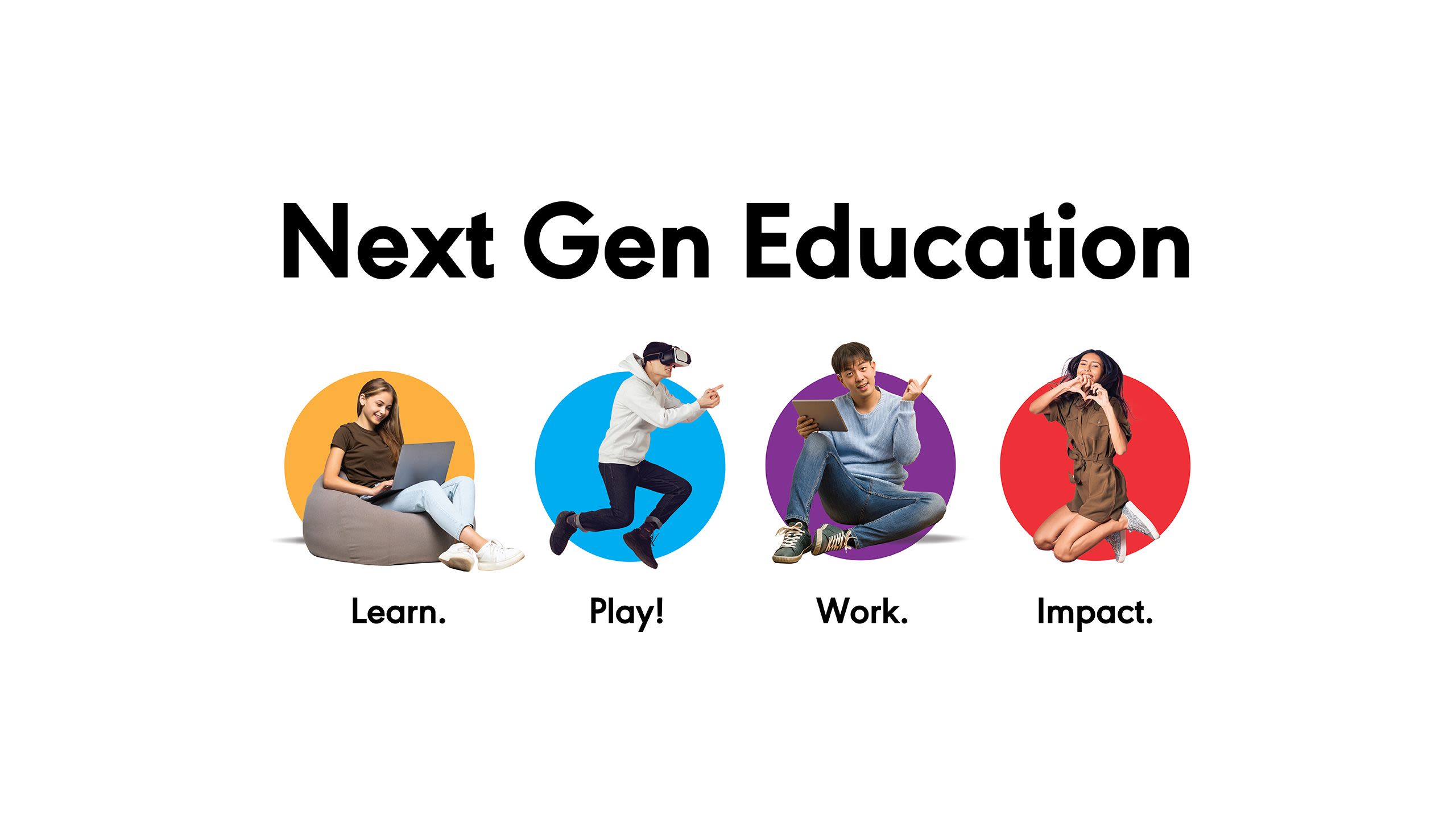Diploma in Computing (Data Analytics)
(E-Learning)

Here's the BIG Picture
The goal of the Diploma in Computing (Data Analytics)-(E-Learning) is to equip students with the necessary skills and abilities to take on a wide range of areas that can help them thrive within the Data Science and Analytics job role. Students should have a mix of knowledge and skills to help an organisation with its ability to store, process and analyse data for the organisation. This curriculum is aimed to help students gain a better knowledge and understanding of data science, data analytics and data visualisation, which are essential for the job role in the analytics in cloud-based environment. By research, data analytics has been ranked as the top skill required for the past several years. There is a bright future for data analytics graduates as many organisations move towards analytics in cloud-supported infrastructure. This certification aims to reskill and upskill professionals and students by offering them the skills and knowledge necessary to be successful in the field of data processing and analytics and its related components, including support in its ecosystem. This programme is ideal for those who want to start their career in data science professions in specific industries.
With this Course You Will:
- Possess essential IT, data science and data analytics knowledge, practical skills and aptitude to meet an entry to starting career as a data analyst;
- Understand data science concepts to gather, clean, process, and transform data for better decision-making
- Analyse and interpret data using an ethically responsible approach
- Apply appropriate analysis models, evaluate input quality, extract understanding from outcomes, and look into potential concerns
- Use computing theory, languages, algorithms, mathematical and statistical models, and optimisation concepts to construct and use data analysis in the most appropriate way
- Have communication, team and interpersonal skills, and are aware of their social and ethical responsibilities;
- Possess skills for lifelong learning and career development
Why Choose BAC College (Singapore)?
Established in 1996, BAC College Singapore (formerly known as ITC School of Laws) offers a wide range of pre-university, and articulation to degree programmes. We provide our students a great educational experience, along with graduate recognition and mobility. Well known for our innovative teaching methods, we offer students an exceptional educational journey, with the choice to graduate from over 25 UK universities that are affiliated to the BAC Education Group.
For online delivery, lectures and tutorials are not subject to any limits on teacher-student ratio.
- Lectures: 1 to 100
- Face-to-Face Tutorials: 1 - 30
In line with our mission of providing quality education that meets international standards, we are consistently lauded for our excellence in the field. We have received consecutive awards of the prestigious 4-year Edutrust, and voted the Gold standard for the JobsCentral Learning TED Awards in 2017.

How Do I Get In?
- 18 years of age and above; with
- GCE A-Level; or
- Completion of Year 12; or
- Completion of less than Year 12 will be considered if it is an official completion of High School in the country of origin; or
- IB Diploma; or
- Pre-university certifications; or
- Polytechnic Diploma; or
- BAC Foundation Diploma; or
- Mature candidates (30 years old or older with 8 years of work experience); or
- Other private or foreign qualifications will be assessed on a case-by-case basis
Language Proficiency
- Pass BAC English Placement Test; or
- IELTS 5.5 or equivalent
Hello there, Welcome to BAC Singapore!
Need advice? Talk to us.
COURSE MODULES
Platform Technology
This module will introduce students to computer system fundamentals, emphasising modern operating systems and networking technology required to support cloud architecture. It covers the following topics: CPU, memory, storage, and peripherals; operating system fundamentals; TCP/IP layered protocols; WAN and LAN networking fundamentals; internetworking and transport protocols; and fundamental computer and network security concepts.
Programming Fundamentals
In this module, students will gain a broad understanding of modern computer programming. They will acquire introductory skills in problem analysis, solution design, and program construction. Through practical programming activities, students will gain an appreciation of the nature and history of computer programming.
Mathematics for IT
This module is designed to develop students’ confidence with mathematical concepts and relationships, their use of mathematics and statistical skills and techniques in a range of contexts specifically problem solving and abstract thinking. Topics covered are numbers, functions and polynomials, sequence and series, matrices, derivatives, integrals, basic statistics and probability.
Introduction to Data Science
This module will introduce students to Data Science principles and tools as well as its general mindset. Students will learn concepts, techniques and tools they need to deal with various facets of data science practice, including data collection and integration, exploratory data analysis, predictive modelling, descriptive modelling, data product creation, evaluation, and effective communication as well as to process business requirement and driving the need of a methodology to address the business requirement. This module will guide students to realise the need on why data scientists need a methodology. The focus in these topics will be on breadth, rather than depth, and emphasis will be placed on integration and synthesis of concepts and their application to solving problems.
Big Data & MongoDB
Students will learn the history and fundamentals of NoSQL databases, their key characteristics, four types of NoSQL databases, how they differ from each other, and their benefits. This course will give students hands-on experience with MongoDB database and Database-as-a-Service (DaaS) offerings.
Data Analysis & Visualisation
This module will expose students to understand and perform data wrangling, exploratory data analysis using python and real world dataset. Students will be learning the pandas and scikit-learn, an open-source library. The library will allow students to load, manipulate, analyse, and visualise datasets as well as use some of its machine learning algorithms to generate models and predictions.
Capstone Project – Data Analytics
This module enables students to complete a design a medium-scale technical solution. In this project, students will be involved in evaluating, selecting and applying knowledge and practical skills acquired from this programme. Students will practise data collection and integration, exploratory data analysis, predictive modelling, descriptive modelling, data product creation, evaluation, and effective communication development, and integration of computer applications and system. They will also construct new and improvised ways of utilising IT / computer solutions and technology to benefit society.
Tuition Fees
You might also like these Courses.
Diploma in Digital Transformation (E-Learning)
Learn the essentials of digital business, the mitigation of digital disruption, and digital transformation strategies with this programme. Enhance your IT knowledge and communication skills, by learning about the latest in AI, FinTech, Cyber Security, Data Science, and many more.
Diploma in Computing (Cloud Computing) (E-Learning)
This programme is ideal for those who want to start their career in cloud computing in specific industries, or experienced professionals looking to upskill, or switch to a different line of work.
Diploma in Computing (Cyber Security (E-Learning)
The programme aims to equip students with the necessary skills that can help them thrive within the field of computing security. Gain the knowledge and skills to assist an organization with its virtual and secure computing requirements.









